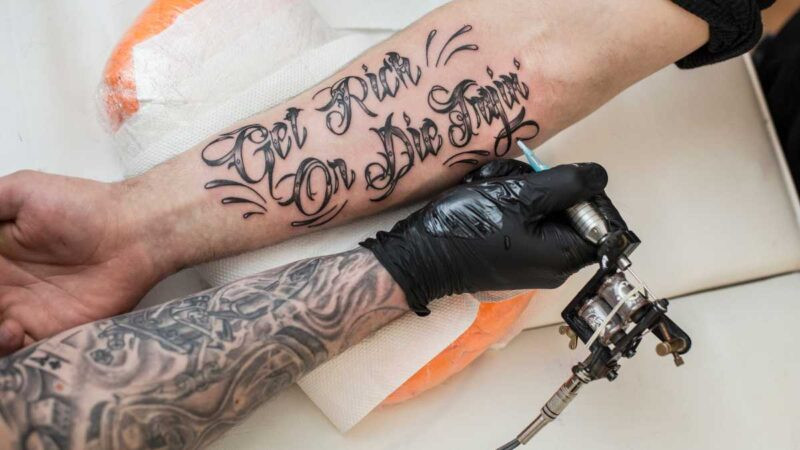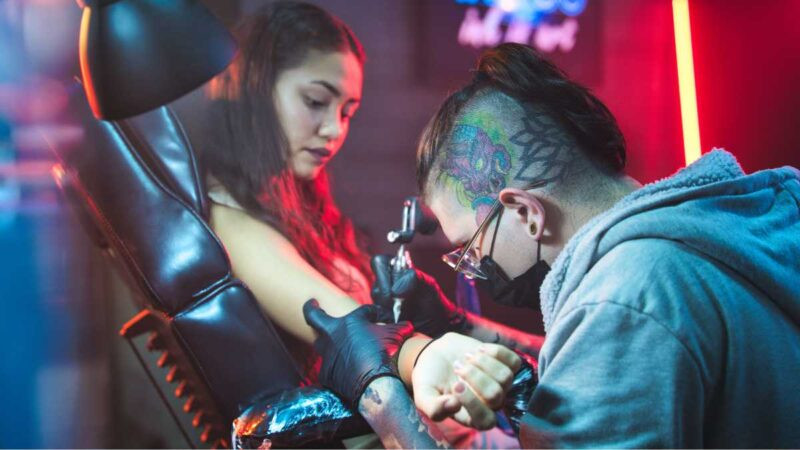Are Tattoos Allowed In Uae? Yes, tattoos are generally allowed in the UAE, but it’s essential to understand the cultural sensitivities and legal nuances surrounding body art. At tattooat.com, we provide comprehensive resources and artistic inspiration to navigate the world of tattooing, ensuring you’re well-informed about tattoo regulations, artistic expression, and cultural respect, to guide you in the United Arab Emirates. Discover everything from tattoo designs to finding the right artist, all while staying informed about local laws.
1. What Are the Current Tattoo Laws in the UAE?
The UAE does not have specific laws that explicitly prohibit tattoos, meaning that individuals are generally free to get tattoos. However, it’s crucial to be aware of cultural norms and potential workplace policies. Although there’s no specific legal regulation, certain sensitivities exist, and visibility of tattoos may be a factor in some professional settings.
Expanding on this, while the absence of explicit laws might suggest freedom, the social and cultural context plays a significant role:
- Cultural Sensitivity: The UAE is a Muslim country with conservative values. Displaying tattoos openly, especially those considered offensive, might attract unwanted attention or offend local customs.
- Workplace Policies: Many companies in the UAE, particularly those in public-facing roles, may have policies against visible tattoos. It’s advisable to check with your employer or potential employers about their stance on tattoos.
- Religious Considerations: Islam traditionally discourages tattoos, viewing them as alterations to God’s creation. While the UAE is tolerant of other religions, it’s respectful to be mindful of these religious beliefs.
- Public Decency: The UAE has public decency laws that prohibit offensive or inappropriate behavior in public. Tattoos with explicit or offensive content could potentially fall under these laws.
It is important to stay updated on local laws and regulations, as they can change. Always respect local customs and traditions when displaying tattoos in public.
2. Can Tourists Get Tattoos While Visiting Dubai?
Yes, tourists can get tattoos in Dubai, as long as they are over 18 years old. It is advisable to choose reputable tattoo parlors that adhere to hygiene standards and respect local customs.
Here’s a more detailed breakdown for tourists considering tattoos in Dubai:
- Age Requirement: Like many places around the world, you must be at least 18 years old to get a tattoo in Dubai legally.
- Reputable Parlors: Ensure that the tattoo parlor you choose is licensed and follows strict hygiene protocols. Researching and reading reviews can help you find a reputable artist.
- Design Considerations: Be mindful of the design you choose. Avoid images or symbols that could be seen as offensive or disrespectful to local culture and religious beliefs.
- Visibility: Consider the placement of your tattoo. If you plan to work or live in the UAE in the future, a discreet placement might be a better choice.
- Temporary Options: If you’re unsure about getting a permanent tattoo, consider henna or temporary tattoos, which are widely available and culturally appropriate.
- Respect Local Customs: Always be respectful of local customs and traditions. Avoid displaying tattoos in religious sites or during religious events.
3. Where Are the Best Tattoo Parlors Located in Dubai?
Finding a reputable tattoo parlor in Dubai requires careful research. Look for parlors with experienced artists, positive reviews, and strict hygiene standards.
Here are some steps to finding the best tattoo parlors:
- Online Research: Start with online searches to identify tattoo parlors in Dubai. Look for parlors with websites, social media profiles, and online reviews.
- Read Reviews: Check online reviews on platforms like Google, Yelp, and Facebook to get an idea of other customers’ experiences. Pay attention to comments about the artists’ skills, the cleanliness of the studio, and the overall atmosphere.
- Check Portfolios: Review the artists’ portfolios to see examples of their work. This will help you assess their style and skill level.
- Visit the Parlor: If possible, visit the tattoo parlor in person to assess the cleanliness and professionalism of the staff.
- Ask for Recommendations: Ask friends, colleagues, or other expats in Dubai for recommendations.
- Check Licensing and Hygiene: Ensure that the tattoo parlor is licensed by the Dubai Municipality and follows strict hygiene protocols.
- Consult with the Artist: Schedule a consultation with the artist to discuss your design ideas and get their feedback. This is also a good opportunity to ask about their experience and qualifications.
- Price Comparison: Get quotes from several tattoo parlors to compare prices. Keep in mind that the cheapest option may not always be the best in terms of quality and hygiene.
- Aftercare Information: Ask about the aftercare instructions and products that the tattoo parlor recommends. Proper aftercare is essential for ensuring that your tattoo heals properly.
- Trust Your Gut: Ultimately, choose a tattoo parlor where you feel comfortable and confident in the artist’s ability to create a tattoo that you’ll love.
4. Are Tattoos Allowed in Islam?
Tattoos are generally considered haram (forbidden) in Islam because they are seen as a form of self-mutilation and alteration of God’s creation. However, personal interpretations may vary.
To elaborate, the Islamic perspective on tattoos is nuanced and often debated:
- Religious Texts: The primary basis for the prohibition of tattoos in Islam comes from interpretations of religious texts, particularly the Hadith, which condemns those who alter their bodies.
- Scholarly Opinions: Islamic scholars have varying opinions on the permissibility of tattoos. Some strictly forbid them, while others may allow them under certain conditions, such as for medical reasons or if they were done before converting to Islam.
- Cultural Practices: Despite the religious concerns, tattoos have been a part of some Muslim cultures for centuries. These traditional tattoos often have specific meanings and are seen as part of cultural heritage.
- Personal Choice: Ultimately, the decision to get a tattoo is a personal one. Some Muslims may choose to get tattoos despite the religious concerns, while others may avoid them out of piety.
- Henna as an Alternative: Henna, a temporary form of body art, is widely accepted in Islam and is often used for celebrations and special occasions. It is seen as a permissible alternative to permanent tattoos.
- Respect for Beliefs: In Muslim-majority countries like the UAE, it’s important to be respectful of local customs and religious beliefs regarding tattoos. Avoid displaying tattoos in religious sites or during religious events.
 Elaborate back tattoo
Elaborate back tattoo
5. Is Henna Considered Acceptable in Islamic Culture?
Yes, henna is widely accepted and celebrated in Islamic culture. It is a temporary form of body art used for celebrations, weddings, and other special occasions.
Henna holds a special place in Islamic culture and is viewed very differently from permanent tattoos:
- Cultural Significance: Henna has been used for centuries in Islamic cultures for beautification, celebrations, and religious ceremonies. It is often applied to the hands and feet of brides before their weddings.
- Religious Approval: Unlike permanent tattoos, henna is considered permissible in Islam because it is temporary and does not involve altering the body in a permanent way.
- Festive Occasions: Henna is commonly used during Eid, weddings, and other festive occasions. It is seen as a way to adorn the body and express joy and celebration.
- Artistic Expression: Henna designs can range from simple patterns to intricate works of art. They often incorporate floral motifs, geometric shapes, and other symbolic elements.
- Natural Dye: Henna is made from the leaves of the henna plant and is considered a natural and safe form of body art.
- Temporary Nature: The temporary nature of henna is one of the main reasons why it is accepted in Islam. The designs typically last for one to three weeks before fading away.
6. What Types of Tattoos Might Be Considered Offensive in the UAE?
Tattoos that depict nudity, religious symbols of other faiths, or anything that could be interpreted as disrespectful to Islam or local culture are considered offensive.
Here are some examples of tattoos that might be problematic:
- Religious Imagery: Tattoos depicting religious figures or symbols from religions other than Islam can be seen as offensive.
- Nudity and Obscenity: Tattoos with explicit or suggestive content are not appropriate in the UAE’s conservative culture.
- Political Statements: Tattoos with political messages or symbols could be problematic, especially if they are critical of the UAE government or its policies.
- Disrespectful Content: Tattoos that mock or disrespect local customs, traditions, or cultural icons are likely to cause offense.
- Gang-Related Symbols: Tattoos associated with criminal gangs or extremist groups are illegal and will not be tolerated.
- Offensive Language: Tattoos with profanity or derogatory terms are considered inappropriate.
- Visible Placement: Even if the tattoo itself is not inherently offensive, its visibility in certain contexts (e.g., religious sites) could still be problematic.
7. Will Having a Tattoo Affect My Chances of Getting a Visa or Working in the UAE?
While there is no explicit law, visible tattoos can sometimes affect employment opportunities, particularly in public-facing roles. It is best to keep tattoos discreetly covered.
To provide a more detailed answer:
- Visa Applications: In general, having a tattoo should not directly affect your chances of obtaining a visa for the UAE. However, it’s important to be aware that immigration officials may take note of visible tattoos, especially if they are deemed offensive.
- Employment Opportunities: Visible tattoos can sometimes be a barrier to employment, particularly in certain industries and professions. Companies in the UAE often have dress codes and appearance standards that may prohibit visible tattoos.
- Public-Facing Roles: Jobs that involve interacting with the public, such as customer service, hospitality, and government positions, are more likely to have restrictions on visible tattoos.
- Conservative Industries: Some industries, such as banking, finance, and law, tend to be more conservative and may have stricter policies regarding tattoos.
- Covering Up: If you have a visible tattoo, it’s advisable to keep it covered while in public and especially during job interviews or while at work.
- Company Policies: Before accepting a job offer, it’s a good idea to inquire about the company’s policies regarding tattoos.
- Cultural Sensitivity: As a general rule, it’s important to be respectful of local customs and traditions in the UAE. Avoid displaying tattoos that could be seen as offensive or disrespectful.
8. What Should I Consider Before Getting a Tattoo in Dubai?
Before getting a tattoo in Dubai, consider the cultural sensitivities, choose a reputable artist, and think about the tattoo’s placement and design.
Here’s a detailed checklist to consider:
-
Cultural Sensitivity:
- Research and understand the local customs and traditions regarding tattoos.
- Avoid designs that could be seen as offensive or disrespectful to Islam or local culture.
- Be mindful of the visibility of your tattoo in public places, especially religious sites.
-
Reputable Artist:
- Choose a licensed and reputable tattoo artist with a proven track record of quality work.
- Check the artist’s portfolio and read reviews from previous clients.
- Ensure that the tattoo studio follows strict hygiene protocols.
-
Placement and Design:
- Consider the placement of your tattoo and how visible it will be in different settings.
- Think about the long-term implications of your tattoo design, especially if you plan to work or live in the UAE.
- Choose a design that is meaningful to you and that you will be happy with for years to come.
-
Legal Considerations:
- Be aware that there are no specific laws prohibiting tattoos in the UAE, but public decency laws could apply to offensive designs.
- Keep in mind that visible tattoos could potentially affect employment opportunities in certain industries.
-
Health and Safety:
- Make sure the tattoo artist uses sterile equipment and follows proper hygiene practices.
- Follow the artist’s aftercare instructions carefully to prevent infection and ensure proper healing.
- Be aware of the potential risks associated with tattoos, such as allergic reactions and skin infections.
-
Personal Choice:
- Ultimately, getting a tattoo is a personal decision. Make sure you are doing it for yourself and not to impress others.
- Take your time to research and plan your tattoo carefully.
- Be confident in your decision before getting inked.
9. Are There Any Regulations for Tattoo Artists and Studios in Dubai?
Yes, tattoo artists and studios in Dubai must register with the Dubai Municipality and adhere to strict hygiene standards to ensure safety.
Here’s what you need to know about the regulations:
- Licensing: Tattoo parlors and artists must obtain a license from the Dubai Municipality to operate legally. This ensures that they meet certain standards of safety and hygiene.
- Hygiene Standards: Tattoo studios are required to maintain strict hygiene standards to prevent the spread of infections. This includes using sterile equipment, disinfecting surfaces, and following proper waste disposal procedures.
- Health Certificates: Tattoo artists may be required to undergo health check-ups and obtain health certificates to ensure that they are free from communicable diseases.
- Age Restrictions: It is illegal to tattoo minors (under the age of 18) without parental consent.
- Design Restrictions: As mentioned earlier, there may be restrictions on the types of designs that are allowed. Tattoos that are deemed offensive or disrespectful to local culture may be prohibited.
- Inspections: The Dubai Municipality conducts regular inspections of tattoo parlors to ensure that they are complying with the regulations.
- Penalties: Tattoo parlors that violate the regulations may face penalties such as fines, suspension of their license, or closure.
10. What Are the Potential Consequences of Having an Illegal Tattoo in the UAE?
While there are no specific laws against having a tattoo, if the tattoo is deemed offensive, it could lead to fines or even deportation under public decency laws.
Let’s break down the potential consequences:
- Fines: If your tattoo is deemed offensive or violates public decency laws, you could face a fine. The amount of the fine will depend on the severity of the offense.
- Deportation: In more serious cases, if your tattoo is considered a threat to public order or national security, you could be deported from the UAE.
- Imprisonment: While it is unlikely, in extreme cases, you could face imprisonment if your tattoo is deemed to incite hatred or violence.
- Social Stigma: Even if you don’t face legal consequences, having a tattoo that is considered offensive could lead to social stigma and discrimination.
- Employment Issues: As mentioned earlier, having a visible tattoo could make it difficult to find employment in certain industries.
- Visa Issues: While it is unlikely, having a tattoo that is considered offensive could potentially affect your visa status.
- Confiscation: In some cases, authorities may confiscate items that display offensive tattoos, such as clothing or accessories.
- Reputation Damage: Being caught with an illegal tattoo could damage your reputation and make it difficult to travel or do business in the UAE in the future.
For inspiration, guidance, and a curated list of top artists and studios, explore tattooat.com today and embark on your tattoo journey with confidence! Address: 1825 SW Broadway, Portland, OR 97201, United States. Phone: +1 (503) 725-3000.
 Tattoos in Dubai
Tattoos in Dubai
FAQ About Tattoos in the UAE
1. Is it legal for tourists to get tattoos in Dubai?
Yes, it is legal for tourists over 18 to get tattoos in Dubai, provided they choose reputable parlors and respect local customs.
2. What types of tattoo designs are considered inappropriate in the UAE?
Designs depicting nudity, disrespect towards Islam, or religious symbols of other faiths can be deemed offensive.
3. Can visible tattoos affect my employment opportunities in Dubai?
Yes, visible tattoos can sometimes limit job opportunities, especially in public-facing roles.
4. Do tattoo artists in Dubai need to be licensed?
Yes, tattoo artists and studios must be licensed by the Dubai Municipality and adhere to strict hygiene standards.
5. Is henna an acceptable form of body art in Islamic culture?
Yes, henna is widely accepted and celebrated as a temporary form of body art in Islamic culture.
6. What should I do if I regret getting a tattoo in Dubai?
Seek professional advice from tattoo removal specialists, keeping in mind the costs and potential scarring.
7. Are there specific laws regarding tattoos in the UAE?
No, there are no specific laws, but public decency laws may apply if a tattoo is considered offensive.
8. Can I be deported for having a tattoo in the UAE?
While unlikely, deportation is possible if a tattoo is deemed a threat to public order or national security.
9. Are there age restrictions for getting a tattoo in Dubai?
Yes, you must be 18 or older to get a tattoo in Dubai legally.
10. How can I find reputable tattoo parlors in Dubai?
Research online reviews, check portfolios, and ensure the parlor is licensed and follows strict hygiene protocols.
